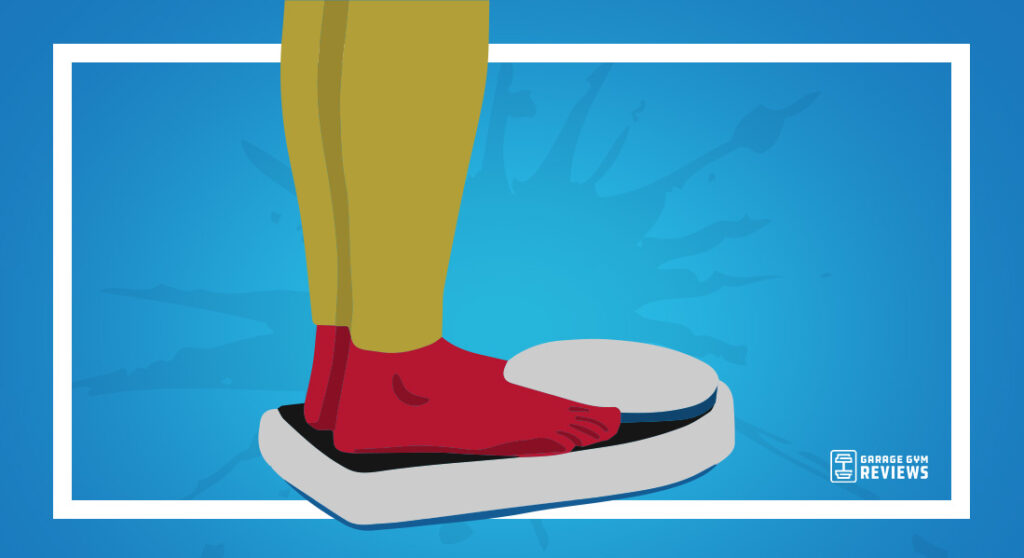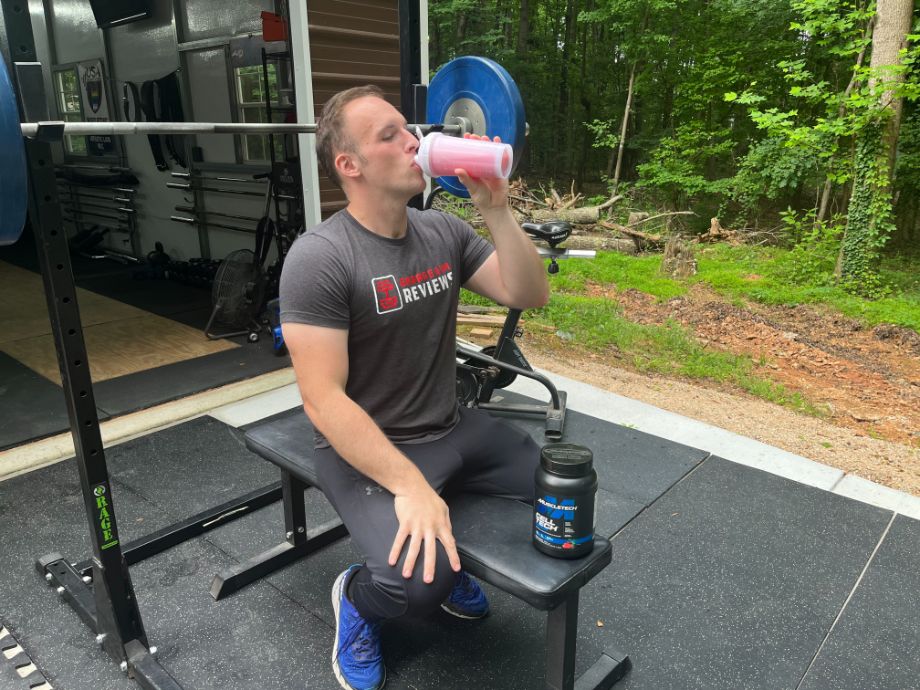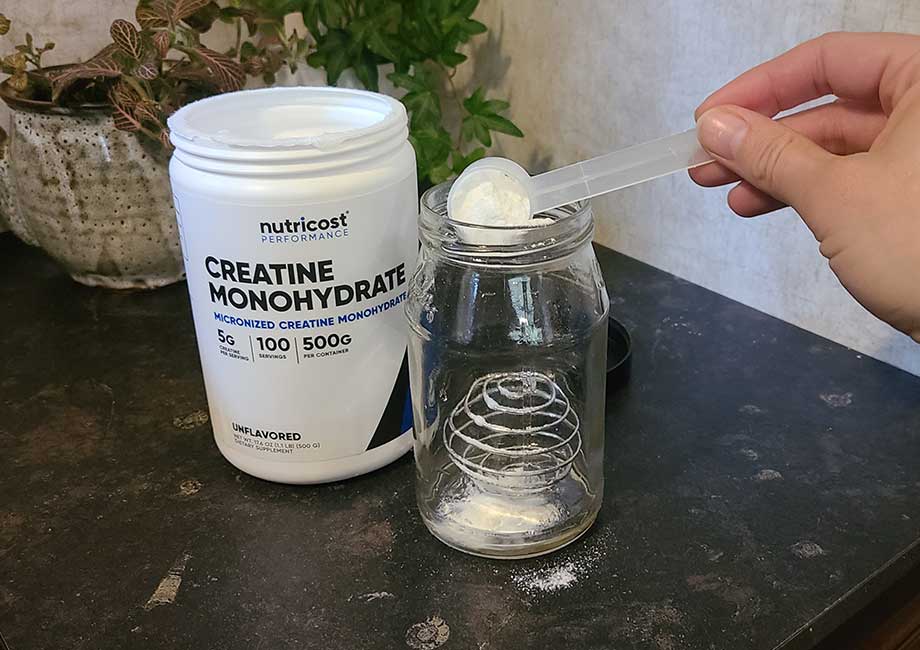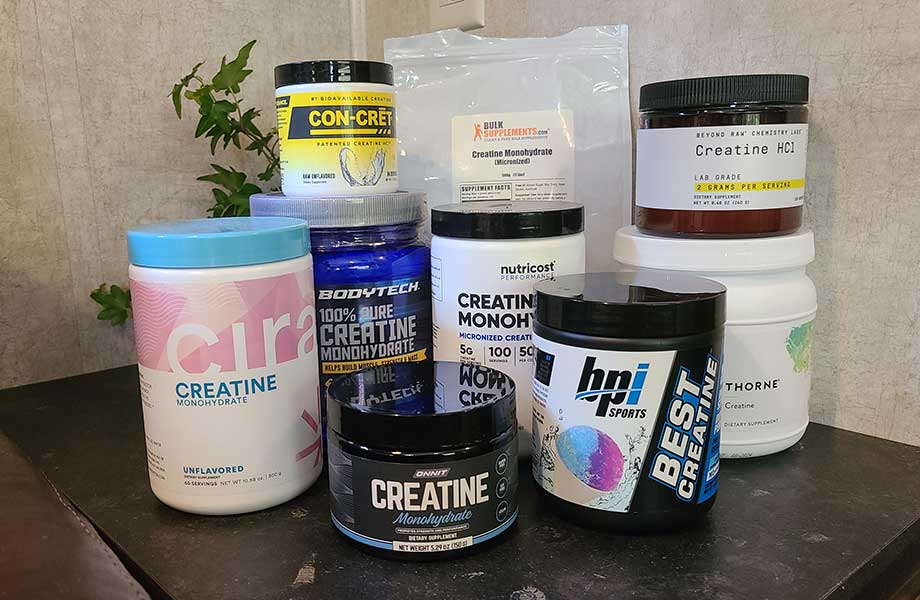We test and review fitness products based on an independent, multi-point methodology. If you use our links to purchase something, we may earn a commission. Read our disclosures.
Creatine is one of the most popular and widely used sports supplements, and it’s getting more popular every year—especially for athletes. Predictably, along with this surge in popularity come plenty of questions about the safety of this inexpensive, flavorless amino acid. Fortunately, creatine is also one of the most studied dietary supplements, along with protein powder and caffeine or pre-workouts.
No matter which creatine side effects you’re worried about, it’s pretty likely that someone has studied it and shown fairly conclusively whether or not it’s a deal-breaker for you. From cramping to kidney damage, here’s what the research shows about creatine monohydrate’s potential side effects.
Medical disclaimer: This article is intended for educational and informational purposes only. It is not intended as a substitute for medical advice. For health advice, contact a licensed healthcare provider.
How Does Creatine Work?
Creatine is produced naturally in the body as it is a chemical compound formed from three nonessential amino acids (arginine, glycine, and methionine). The active form of creatine is phosphocreatine, which generates adenosine triphosphate (ATP) for muscle energy, thus allowing your muscles to contract and perform during training.
Creatine Benefits
As one of the most well-studied nutritional supplements, it’s not an exaggeration to say creatine is more known for its benefits than its side effects. Creatine users see increases to their muscle mass and size as a result of the training energy generated by elevated creatine levels. Some lifters even say it improves their overall athletic performance.
We previously covered 10 creatine benefits in another article. Check them out!
Potential Creatine Side Effects
Weight Gain
The International Society of Sports Nutrition Position Stand1 on creatine safety and efficacy calls weight gain “the only consistently reported side effect from creatine supplementation.” Of course, not everyone considers this an adverse effect. Plenty of weightlifters and athletes take creatine primarily because they want to add muscle mass.
However, if you have to compete in a weight-classed sport, are chasing weight loss, or you just want to experience the benefits of creatine for exercise performance without adding body mass, you might think creatine is off the table for you. Not so fast.

RELATED: Does Creatine Make You Gain Weight?
Garage Gym Reviews author and supplement researcher Krissy Kendall, Ph.D., says the initial weight gain from creatine occurs from water drawing into muscle cells, and it’s primarily a risk if you follow high-dose, short-term creatine loading protocols. While reviewing the best creatine supplements, Kendall noted that taking five 5-gram doses a day (the most common loading scheme) can cause an initial water weight gain of 1-2% of body weight.
“However, this is far less likely to occur if following a low-dose protocol,” she says. Taking 3 to 5 grams daily consistently will raise muscular creatine levels enough to provide the beneficial effects of creatine, with very little risk of excess water retention.
Digestive Issues
One of the most feared side effects of creatine is that it might cause bloating, stomach pain, or other types of digestive distress. Similar to water retention, this side effect has been shown to be more of a risk if you take large doses of creatine.
For example, a study from 20082 tracked athletes who took 10 grams of creatine in a serving, and found they suffered from diarrhea and an upset stomach. Those who took a far-lower 2- to 5-gram single dose didn’t experience those side effects.
For this reason, the vast majority of creatine studies recommend taking smaller doses of 3 to 5 grams, even if you’re in a loading phase. Doses of 10 grams of more are also a waste of your creatine (and your money), since your body will simply excrete out what it can’t absorb—and might make you feel pretty awful.
RELATED: Types of Creatine
Muscle Cramps
Stop us if you’ve heard this one before, but muscle cramping from creatine use is often an indication that you’re simply taking too much creatine. One study of collegiate football and baseball players3 found that while 25% of players experienced cramping, a whopping 91% of them were exceeding the recommended creatine maintenance dose. You can do better, guys.
When creatine is taken properly, a number of studies in recent years, including one of college football players training in the heat, have concluded that it can actually help prevent muscle cramps and improve heat tolerance4. Just don’t start triple-scooping and you should be fine.
Kidney Damage
Concerns about creatine damaging kidneys go all the way back to 1998, according to the 2021 International Society of Sports Nutrition study Common Questions and Misconceptions about Creatine Supplementation5. And over the last 25-plus years, the authors state, no research has concluded that the recommended doses of creatine pose any risk to cause kidney disease, or to damage renal health or kidney function in healthy individuals. But the concern persists, they say, because of “a poor understanding of creatine and creatinine metabolism.”
Here’s what is actually bad for your kidneys: workouts so long and intense that you put yourself at risk of rhabdomyolysis, a condition where you do so much damage to your muscle tissue that it releases protein into the blood. This can damage the heart and kidneys and cause permanent injury or even death.
The lesson for you: don’t overdo high-intensity or really any intensity exercise, and don’t trust any supplement to make you bulletproof against bad training choices. And if you have any health issues that you think make your case unique, discuss them with your healthcare professional before starting to take any nutritional supplements—including creatine.
Possible Interactions
To date, no risky interactions between creatine and prescription drugs have been well-documented.
Some doctors recommend not taking creatine if you take non-steroidal anti-inflammatory drugs, or NDAIDs, such as ibuprofen or acetaminophen. But that likely has more to do with the NSAIDs than the creatine. Heavy or long-term use of NSAIDs is known to pose risk to kidney function, which is a big reason why over-the-counter pain meds’ warning labels only recommend short-term use.
Other Side Effects
There are a few more creatine side effects that you may come across, such as:
- Acne
- Dehydration
- Hair loss
These are mostly misinterpreted data or common misconceptions. Sports dietitian Destini Moody, RD, CSSD, LD, it’s this way when discussing whether or not creatine causes acne, “The confusion might be the result of correlation versus causation. It is common for people who take creatine to sweat a lot since they exercise a lot. When sweat is produced, it also releases an oil called sebum with it. When this builds up excessively, especially if you exercise in heat, acne can occur. However, creatine is far from the culprit in these cases.”
For more from Destini check out her article on common creatine myths.
Uses for Creatine
Athletic Performance
Many of the most beneficial effects of creatine supplementation happen in sports—especially sports where sprinting and speed are high priorities.

Here’s why: oral creatine supplementation increases your reserves of the compound phosphocreatine. This is the human body’s fuel of choice for any high-speed movement lasting 15 seconds or less. Having more creatine phosphate, in turn, helps provide your body a quick-and-ready supply of adenosine triphosphate, or ATP, helping you recover quickly between high-intensity efforts.
That may sound like the definition of a “performance-enhancing substance,” but the United States Anti-Doping Agency is clear that creatine isn’t a banned substance or a steroid. It’s found naturally in food, but is also allowed as a supplement to boost athletic performance.
RELATED: Best Creatine for Women
Bodybuilding
Creatine may seem like a no-brainer for or lifters interested in building muscle. And a recent meta-analysis6 authored by some of the biggest names in sports supplements research concluded that taking creatine “promotes a small increase” in muscle mass for both the upper and lower body.
Just don’t overlook one word there: small. The muscle growth effects of creatine pale in comparison to what you get from proper training, getting enough sleep, eating adequate calories, and consuming enough carbohydrates, fats, and protein for muscle gain. And if you don’t have those in a decent place, no dose or form of creatine is going to do much for you.
That said, certain nutritional systems might be posed (so to speak) to experience more or less bodybuilding benefit from creatine than others. For example, a 2020 review7 in the International Journal of Environmental Research and Public Health found that vegan or vegetarian athletes who don’t get creatine from red meat or animal protein are “likely” to benefit from creatine supplements.
Heart Failure
Getting tired easily is one of the most common symptoms of heart failure. One possible contributor for this is that your body’s natural creatine levels go down while suffering from this condition. This can make both daily living and therapeutic exercise feel immensely difficult.
A number of studies have looked at the therapeutic potential of oral creatine supplementation for people with heart failure, with very positive results. Creatine supplementation improved patients’ overall exercise capacities8 and muscle strength, compared to those who only took a placebo. One study found9 that taking creatine in addition to standard heart disease medication also helped patients to maintain or increase their body weight.
Parkinson’s Disease
The neurological condition Parkinson’s disease disrupts the function of mitochondria, the energy powerhouses of human cells. And creatine is known to support or enhance mitochondrial function. So it makes sense that creatine could have the potential to be beneficial for Parkinson’s patients.
Unfortunately, the small number of studies looking into creatine as a Parkinson’s treatment10 found that it didn’t outperform a placebo or make a meaningful change in the progression of the disease. Troublingly, one study11 found that for Parkinson’s sufferers who have a certain gene and also take high amounts of caffeine and creatine, the combination may speed the progression of the disease.
Muscular Dystrophy
A number of studies, gathered in a review published in Cochrane Database of Systematic Reviews12, have found that creatine supplementation helped children suffering from muscular dystrophy to improve muscle strength and “functional performance.”
However, there aren’t many longer-term studies of using creatine monohydrate to treat muscular dystrophy, and patients or parents of patients should work closely with their healthcare professional to determine if this is an appropriate choice for them.
How to Dose Creatine
Dosing creatine shouldn’t be viewed as a short-term project. The benefits of this dietary supplement only occur over a period of weeks or months, so taking it consistently is essential.

The two most science-backed dosage protocols for creatine are:
- A five-day “loading phase” of 20-25 grams per day (in 5-gram doses), followed by a 3-5 gram daily maintenance dose
- 3-5 grams daily with no loading phase
Most of the side effects of creatine supplementation occur during a loading phase, or when people take more than a maintenance dose. For this reason, it’s fine to skip the loading protocol and simply go maintenance from the start. After a couple of weeks, your creatine levels will be at the same place, but you’ll have a dozen or more doses still in your jug for the future.
RELATED: How to Take Creatine
Creatine Side Effects: Final Thoughts
Many of creatine’s most feared side effects can be chalked up to human error (usually by simply taking too much), or have been disproven in research. More athletes than ever are seeing more reward than risk in their use of creatine, which can help them see improved athletic performance, strength, and muscle growth.
However, not everyone will experience the same benefits, and certain people suffering from Parkinson’s disease might be at risk of the disease progressing more quickly if they take creatine along with high doses of caffeine. Definitely get medical advice from your healthcare provider before making any dramatic changes to your diet or supplement approach, or if you have any unique medical conditions or health concerns.
Creatine Side Effects: FAQs
Are there any negative effects of creatine?
What may affect one creatine user may not affect another, but some have reported negative effects such as weight gain (typically water weight), digestive upset, or muscle cramps. There are also several creatine myths that point to creatine causing acne or kidney issues, but neither have been proven in studies. If you’re concerned about (or are experiencing) negative side effects from taking creatine, first, make sure you’re taking the recommended dose, then consult with a health professional or registered dietitian.
Is creatine safe for daily use?
If you’re going to take creatine, you should do it every day. The effects of creatine supplementation don’t happen from a single dose. They happen when you raise your creatine levels and keep them elevated for weeks or months straight.
Is creatine good for your body or not?
If you already eat a lot of red meat or animal protein, you might be consuming enough dietary creatine that taking a supplement won’t do much for you. However, especially if you are vegan, vegetarian, or don’t eat a lot of animal protein, creatine might provide some of the same benefits, like increased muscle mass, or help make your workouts more effective.
Does creatine make you look puffy?
Creatine might make you look puffy if you’re taking a lot of it in a short period of time, such as if you’re following a loading protocol. If that’s a concern, you can skip the loading phase and simply take a 3- to 5-gram dose daily. This should provide creatine’s athletic and muscle growth benefits without causing water retention or puffiness.
How does creatine make you feel?
It’s very unlikely that you’ll feel anything when you take creatine on its own. It’s not a stimulant, and it hasn’t been shown in research to have any acute side effects that should make you feel strange. However, if you take creatine and a pre-workout supplement that contains caffeine or other stimulants, it’s very possible you will feel those ingredients working.
Is creatine safe for the heart?
There is no evidence to support that creatine can have negative cardiovascular effects. One 2021 study in Nutrients13 states they, “found no risk of, among else, cardiac adverse events by creatine supplementation.”
What happens when I stop taking creatine?
When you stop taking creatine, you may experience losses of water weight and energy, but otherwise, your body will revert to producing its normal amount of creatine. Your muscle gains shouldn’t just disappear overnight but may not look as full—due to the water reduction.
These statements have not been evaluated by the Food and Drug Administration. This product is not intended to diagnose, treat, cure, or prevent any diseases.
References
- Kreider RB, Kalman DS, Antonio J, et al. International Society of Sports Nutrition position stand: safety and efficacy of creatine supplementation in exercise, sport, and medicine. J Int Soc Sports Nutr. 2017;14:18. Published 2017 Jun 13. doi:10.1186/s12970-017-0173-z
- Ostojic SM, Ahmetovic Z. Gastrointestinal distress after creatine supplementation in athletes: are side effects dose dependent?. Res Sports Med. 2008;16(1):15-22. doi:10.1080/15438620701693280
- Greenwood M, Farris J, Kreider R, Greenwood L, Byars A. Creatine supplementation patterns and perceived effects in select division I collegiate athletes. Clin J Sport Med. 2000;10(3):191-194. doi:10.1097/00042752-200007000-00007
- Greenwood M, Kreider RB, Melton C, et al. Creatine supplementation during college football training does not increase the incidence of cramping or injury. Mol Cell Biochem. 2003;244(1-2):83-88.
- Antonio J, Candow DG, Forbes SC, et al. Common questions and misconceptions about creatine supplementation: what does the scientific evidence really show?. J Int Soc Sports Nutr. 2021;18(1):13. Published 2021 Feb 8. doi:10.1186/s12970-021-00412-w
- Burke R, Piñero A, Coleman M, Mohan A, Sapuppo M, Augustin F, Aragon AA, Candow DG, Forbes SC, Swinton P, et al. The Effects of Creatine Supplementation Combined with Resistance Training on Regional Measures of Muscle Hypertrophy: A Systematic Review with Meta-Analysis. Nutrients. 2023; 15(9):2116. https://doi.org/10.3390/nu15092116
- Kaviani M, Shaw K, Chilibeck PD. Benefits of Creatine Supplementation for Vegetarians Compared to Omnivorous Athletes: A Systematic Review. International Journal of Environmental Research and Public Health. 2020; 17(9):3041. https://doi.org/10.3390/ijerph17093041
- Aquilani R, Viglio S, Iadarola P, et al. Oral amino acid supplements improve exercise capacities in elderly patients with chronic heart failure. Am J Cardiol. 2008;101(11A):104E-110E. doi:10.1016/j.amjcard.2008.03.008
- Kuethe F, Krack A, Richartz BM, Figulla HR. Creatine supplementation improves muscle strength in patients with congestive heart failure. Pharmazie. 2006;61(3):218-222.
- Writing Group for the NINDS Exploratory Trials in Parkinson Disease (NET-PD) Investigators, Kieburtz K, Tilley BC, et al. Effect of creatine monohydrate on clinical progression in patients with Parkinson disease: a randomized clinical trial. JAMA. 2015;313(6):584-593. doi:10.1001/jama.2015.120
- Simon DK, Wu C, Tilley BC, et al. Caffeine, creatine, GRIN2A and Parkinson’s disease progression. J Neurol Sci. 2017;375:355-359. doi:10.1016/j.jns.2017.02.032
- Kley RA, Tarnopolsky MA, Vorgerd M. Creatine for treating muscle disorders. Cochrane Database Syst Rev. 2013;2013(6):CD004760. Published 2013 Jun 5. doi:10.1002/14651858.CD004760.pub4
- Balestrino M. Role of Creatine in the Heart: Health and Disease. Nutrients. 2021 Apr 7;13(4):1215. doi: 10.3390/nu13041215. PMID: 33917009; PMCID: PMC8067763
Further reading

Is this new Assault fan bike the best out there? Find out in our Assault Bike ProX review. Read more

Looking for your next favorite protein bar? Find out if this one is right for you with our Quest Protein Bar review. Read more

When you want fresh air while you work out but you don’t want to let the bugs in, our top picks for best garage door screen has you covered. Read more

Home gyms can be a little bit of an upfront cost. Cut down on some of that initial investment with our list of the best home gyms under $500. Read more

